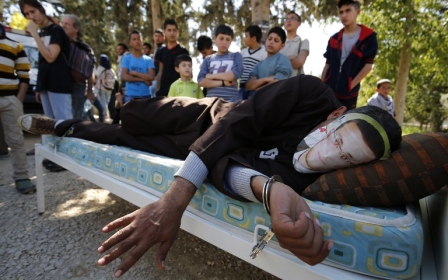Israel court rejects appeal on force-feeding hunger strikers

Israel's Supreme Court rejected an appeal from the Israel Medical Association on Sunday and authorised the force-feeding of hunger-striking prisoners, a court document showed.
"This law is legal under Israeli law and international law," the court ruled of the legislation, passed in July 2015, allowing hunger-strikers to be force-fed if their lives are in danger.
"Saving a life must remain the priority and the state is responsible for the lives of its prisoners," the judges said.
The law was created to end what the Israeli authorities consider to be blackmail by Palestinian prisoners for whom hunger strikes are a common tactic.
The medical association appealed against the law after doctors complained of becoming embroiled in the political dispute.
Israel Medical Association chairman Dr Leonid Eidelman told Haaretz earlier: “This is a case in which medical ethics unequivocally trump the law, and the message we wish to convey to physicians is that forced feeding is tantamount to torture and that no doctor should take part in it.”
The judges added: "The state is responsible for the safety of prisoners but also of its citizens whose safety may be endangered because of events such as a hunger strike by prisoners."
However, Israeli MP Tamar Zandberg responded to the Supreme Court ruling by saying “one doesn’t need the high court in order to realise that this law is cruel, immoral, unethical, and will not be carried out by any doctor".
Haaretz quoted him saying: "Force-feeding is defined as abuse and is contrary to the Hippocratic Oath. The law is intended to be defiant and intimidating, not to be enacted in practice. Those who are so concerned about Israel’s image around the world have tarnished it with a black stain by proposing this bill which should never have seen the light of day.”
Several Palestinian prisoners held under Israel's controversial administrative detention law, which allows suspects to be held for renewable six-month periods without trial, have staged recent hunger strikes. All of them called off their protests after being given reassurances that their detention would not be renewed.
Israel says the controversial practice allows authorities to hold suspects while continuing to gather evidence. However, Palestinians, human rights groups and members of the international community have condemned the system.
There are currently around 7,000 Palestinian prisoners held by Israel, of whom some 700 are under administrative detention, a procedure dating back to the British mandate of Palestine.
Middle East Eye propose une couverture et une analyse indépendantes et incomparables du Moyen-Orient, de l’Afrique du Nord et d’autres régions du monde. Pour en savoir plus sur la reprise de ce contenu et les frais qui s’appliquent, veuillez remplir ce formulaire [en anglais]. Pour en savoir plus sur MEE, cliquez ici [en anglais].




